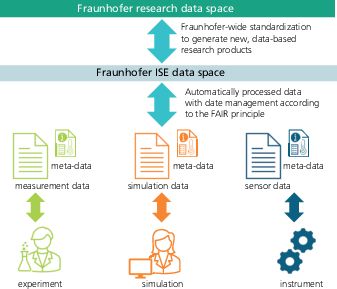News #14
"BatterieDigital_real" project: Artificial intelligence for battery research
The digitalization of research opens up numerous opportunities for innovative, data-based R&D services, while at the same time requiring standardized data management. In the new Fraunhofer-Gesellschaft pilot project "BatterieDigital_real", various institutes are creating a research data space for battery research. The Fraunhofer Institute for Solar Energy Systems ISE is collaborating with the University of Auckland to combine battery development and artificial intelligence.

In the battery projects of Fraunhofer ISE, different types of research and development data are collected along the value chain, whether in quality assurance in battery cell production or through long-term tests in the battery test laboratory. The large volumes of generated research data are currently collected, analyzed, and stored according to individual procedures.
Seven institutes of the Fraunhofer-Gesellschaft are therefore working on standardized and automated data storage in the "BatterieDigital_real" project. This is based on the specific use cases "Determining the residual value of batteries for sale" and "2nd-use qualification of batteries by recyclers". The aim of the pilot project is to store and link data in a standardized way across institutes according to the FAIR principle: Findable, Accessible, Interoperable, and Reusable. "Good data management facilitates data analysis and allows large volumes of data to be evaluated using artificial intelligence," explains Dr. Moritz Kroll, who is working on the project with his Battery Data Science team at Fraunhofer ISE.
Strategic cooperation with the University of Auckland
Digitalization opens up completely new possibilities for battery research, explains Dr. Kroll: "By combining battery research and artificial intelligence, we can work faster and more efficiently. The aggregation of large amounts of data makes it possible to work on new issues from material synthesis to battery production and quality control." In addition, the requirements of national and international funding institutions for handling data can be met and the position in international competition improved. New cross-institutional digital business models are also conceivable.
For the digitalization of its research, Fraunhofer ISE relies on the strategic cooperation with the University of Auckland in New Zealand, which has excellent expertise in the field of artificial intelligence. In particular, Associate Professor Andreas Kempa-Liehr is a leading expert in the field of systematic analysis of time series data. Funded by the Fraunhofer International Mobility Program, Dr. Kroll will complete a research stay in the Data Science Group at the University of Auckland and prepare future joint projects. "We are looking forward to the collaboration with Fraunhofer ISE in this important future topic and especially to Dr. Kroll's research stay at the Faculty of Engineering at the University of Auckland," explains Associate Professor Andreas Kempa-Liehr.
Downloads and Links
- Project Website BatterieDigital_real (ise.fraunhofer.de)
- Project Website SAMBA (ise.fraunhofer.de)
Last modified: